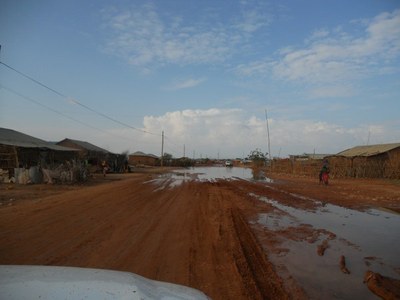Dispatches from Ethiopia: After the rain

Ann Speak explains how the recent rains in Gode have affected the community's livelihood's.
"Leaving green Addis Ababa in the highlands and flying towards Dire Dawa on the first leg of our journey provided a stark contrast. I see the wrinkled skin of bald mountains, grey terrain and dried up river beds spread out below the plane (see video here). However, as we approach Gode, we see the signs of recent heavy rains in the form of glassy puddles and deep crevices in the sandy soil.
After the rain
In an area where rains are scarce – in this case, two years in a row - there is no need to construct or maintain sidewalks, drainage ditches or sewers in Gode. Pot holes in the road are clearly visible and avoidable by the donkeys pulling carts or the pedestrians. But after rain the place changes. Potholes fill with orange water. The soil is no longer tossed around by the strong winds hiding in curtains, cracks and crevices. Red dust turns to doughy mud, sticking to shoes, tires and cars doors.
Swimming in potholes
Kids play enthusiastically in small pools encased in potholes. Floating objects provide hours of entertainment and naked children splash through the copper coloured water. And some potholes are big enough for them to swim and cool off in the afternoon sun.
Within days of water falling on parched soil, delicate strands of grass push through the hardened soil, forming small carpets of emerald green. Bushes that were once stripped of leaves now bear fresh green leaves, just right for hungry camels. Within three weeks, the surviving livestock recover from prolonged water deprivation.
Not everyone in Gode is happy with the arrival of the rains…
Even though the children are playing in the water, floating anything they can get their hands on, some homes have suffered damage because of the strong rain.
Some of the mud has been washed away from this home (left), and others have begun to lean to one side. In a community with a collapsing economy, housing is among the last things a family will spend money on- the need for food and water take priority. The SOS Children Family Strengthening Programme has identified people in the community suffering from poor housing and provided money to either rehabilitate or build new homes.
Once houses are patched up, and the animals have more to eat, town people will be happy. The price animals will go down and there will be more meat on the animal once it’s slaughtered.
After long periods of drought, people often experience flash floods. When this happens, there is a system in place to warn people to evacuate – neighbours relay the messages by someone running to the next village so on. People pull together to help each other out."
How you can help
You can make a one-off donation directly to our Emergency Relief Programme in East Africa, or take out a child sponsorship to help us to focus on the long-term welfare of children who have no one to care for them as a result of the famine.

 Return to Schools Wikipedia Home page…
Return to Schools Wikipedia Home page…
